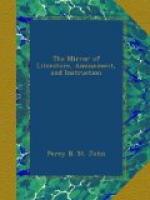There was a planter in Barbadoes that came to his neighbour, and said to him, “Neighbour, I hear you have lately brought good store of servants out of the last ship that came from England; and I hear withal that you want provisions. I have great want of a woman servant, and would be glad to make an exchange. If you will let me have some of your woman’s flesh, you shall have some of my hog’s flesh.” So the price was set, a groat a-pound for the hog’s flesh, and sixpence for the woman’s. The scales were set up, and the planter had a maid that was extremely fat, lazy, and good for nothing; her name was Honour. The man brought a great fat sow, and put it in one scale, and Honour was put in the other. But when he saw how much the maid outweighed his sow, he broke off the bargain and would not go on.
* * * * *
SMOKING.
Such is the passion for smoking at Hamburgh, that children about ten years of age may be seen with pipes in their mouths, whiffing with great gravity and composure.
* * * * *
PUBLIC ROADS.
The turnpike-roads of England are above twenty thousand miles in length, and upwards of a million sterling is annually expended in their repair and maintenance.
* * * * *
John Bulwer, M.D. was author of many books, the most curious of which were his “Anthropo Metamorphoses,” and “Pathomyotomia.” We might conclude he was of Irish extraction; St. Patrick, the old song says, “ne’er shut his eyes to complaints,” and Bulwer in his “Instructions to the Deaf and Dumb,” tells us they are intended “to bring those who are so born to hear the sound of words with their eyes!”—Wadd’s Memoirs.
* * * * *
CRANIOLOGY.
Philosophy is a very pleasant thing, and has various uses; one is, that it makes us laugh; and certainly there are no speculations in philosophy, that excite the risible faculties, more than some of the serious stories related by fanciful philosophers.—One man cannot think with the left side of his head; another, with the sanity of the right side judges the insanity of the left side of his head. Zimmerman, a very grave man, used to draw conclusions as to a man’s temperament, from his nose!—not from the size or form of it, but the peculiar sensibility of the organ; while some have thought, that the temperature of the atmosphere might be accurately ascertained by the state of its tip! and Cardan considered acuteness of the organ a sure proof of genius!—Ibid.
* * * * *




